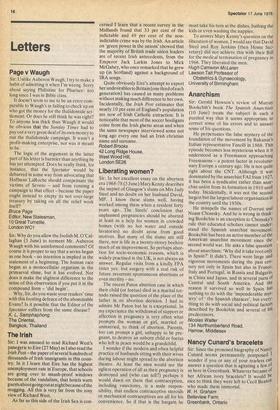Liberating women?
Sir: In her excellent essay on the abortion era 1968-78(3 June) Mary Kenny describes the impact of Glasgow's slums on Mrs Judy Steel and no doubt on her husband David, MP. I know these slums well, having worked among them when a resident forty years ago. The Steels' conclusion that unplanned pregnancies should be aborted at least as a help for women in crowded homes (with no hot water and outside lavatories) no doubt arose from good motives. But many of the slums are still there, nor is life in a twenty-storey beehive much of an improvement. So perhaps abortion for socio-economic reasons, which is widely practised in the UK, is not always an answer. Regular visits from a kindly FPA sister yes: but surgery with a real risk of future recurrent spontaneous abortions or even sterility — no.
The recent Paton abortion case in which their child (or foetus) died in a marital tornado raised the question of the place of the father in an abortion decision. I had to admire Mr Paton but he is exceptional. In my experience the withdrawal of support or affection in pregnancy is very often what prompts the woman or girl, married or unmarried, to think of abortion. Parents, too can prompt a girl, unhappy to be pregnant, to destroy an unborn child or foetus who left in peace would be a grandchild.
I wonder if the modern and often helpful practice of husbands sitting with their wives during labour might spread to the abortion theatre. At least the men would see the ugliest operation of all as their pregnancy is destroyed and (who can tell?) perhaps it would dawn on them that contraception, including vasectomy, is a male responsibility, that endless contraceptive steroids or mechanical contraceptives are all for his convenience. So if that is the bargain he must take his turn at the dishes, bathing the kids or even washing the nappies.
To answer Mary Kenny's question on the liberation of women, I would say that David Steel and Roy Jenkins (then Home Secretary) did not achieve this with their Bill for the medical termination of pregnancy in 1966. They liberated the men.
Hugh Cameron McLaren Lawson Tait Professor of Obstetrics & Gynaecology, University of Birmingham


































 Previous page
Previous page